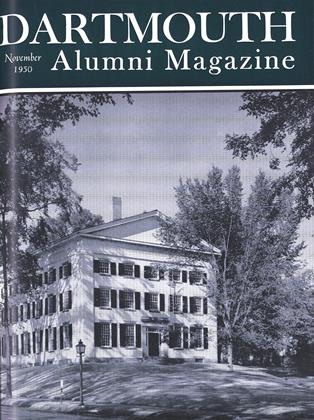A GIFT to Dartmouth of $250,000 from John D. Rockefeller Jr. of New York was announced by President Dickey on October 22, following the annual fall meeting of the Board of Trustees. Mr. Rockefeller adopted this means of expressing his high regard for President-Emeritus Hopkins and requested that his gift be used to endow student scholarships bearing the name of Dartmouth's retired leader.
In carrying out Mr. Rockefeller's wishes, the Trustees have voted to create from the funds a permanent endowment for the Ernest Martin Hopkins Scholarships. Established by the Trustees in 1945, at the time of Mr. Hopkins' retirement, these scholarships provide full tuition, room and board for the sons of Dartmouth men who gave their lives in World War II.
At present two Hopkins Scholars are enrolled at Dartmouth. It is estimated that 41 boys in all are eligible for the awards, with peak enrollment coming between 1961 and 1965 when there may be as many as 23 Hopkins Scholars in college. After all eligible boys have received this aid, Mr. Rockefeller's gift will be used to endow general student scholarships bearing Mr. Hopkins' name.
In transmitting his gift to the Dartmouth Trustees, Mr. Rockefeller wrote a letter to John R. McLane '07, Clerk of the Board, expressing his great esteem and affection for Mr. Hopkins and paying tribute to his outstanding service to American education. The letter follows:
DEAR MR. MCLANE: Many years ago when y son, Nelson, was a student at Dartmouth, at the request of Dr. Hopkins, who was then the President of the College, I spoke to the alumni at Commencement time. I availed of the occasion to say that if I were a young man trying to decide where I would go to college, I would find out of what college Dr. Hopkins Avas President and go there, so high was my regard for him. Later on, during the depression, meeting Dr. Hopkins one summer I said to him, "I presume you are having a hard time making both ends meet financially at the college," to which he replied, "It is not problems of finance that give me sleepless nights but rather the question as to whether we are giving our students the kind of education they need to prepare them to play their part adequately in this disjointed world into which they are currently being graduated.'
Dr. Hopkins' one thought was always as to how Dartmouth could best serve the needs o£ its students. While fully in touch with educational experience and trends, he was never bound by any practice or tradition which seemed to him at the time at variance with the objective of fitting men adequately for their life work. One of the foremost educational leaders of his-day and generation, I have always held Dr. Hopkins in highest esteem and affection and have often wished that I could bear enduring testimony to the outstanding service he has rendered in the educational field.
While, except in a very few special instances, I have not myself made contributions to educational institutions other than my Alma Mater, having felt that through the General Education Board, which my father established and generously endowed, the obligation of his family to education had been well and wisely met, I should like to take advantage of the present financial campaign which Dartmouth is conducting as a medium through°which in a modest way to pay tribute to Dr. Hopkins.
To that end it is a pleasure to send the college the securities listed on the enclosed sheet as a contribution toward its Development Program. In view of the scholarship needs about which you wrote me, I suggest that this gift be applied as endowment for student scholarships to honor Dr. Hopkins and bear his name and to be awarded on such basis as the Trustees may determine to be most helpful in furthering Dartmouth's objectives.
With every good wish for the success of the college's program, I am,
Very sincerely,
 View Full Issue
View Full Issue
More From This Issue
-
 Article
ArticleA Detective Story From the Far North
November 1950 By ELMER HARP JR -
 Class Notes
Class Notes1918
November 1950 By ERNEST H. EARLEY, DONALD L. BARR, DAVID L. GARRATT -
 Class Notes
Class Notes1905
November 1950 By GEORGE W. PUTNAM, GILBERT H. FALL -
 Article
ArticleConvocation Address
November 1950 -
 Class Notes
Class Notes1923
November 1950 By TRUMAN T. METZEL, COLIN C. STEWART 3RD -
 Article
ArticleAssociated School News
November 1950
Article
-
 Article
ArticleTHE RHODES SCHOLARS
May, 1914 -
 Article
ArticleTRACK TEAM LISTED AS ALUMNI FUND CONTRIBUTOR
August, 1926 -
 Article
ArticleMasthead
May 1943 -
 Article
ArticleThe Community College
March 1948 By HUGH MORRISON '26 -
 Article
ArticleDORMS COME OF AGE
November 1934 By Milburn McCarty IV '35 -
 Article
ArticleMedical School
July 1948 By ROLF C. SYVERTSEN, M.D.

